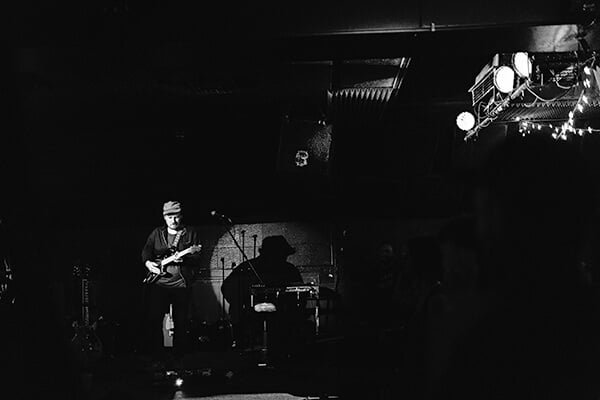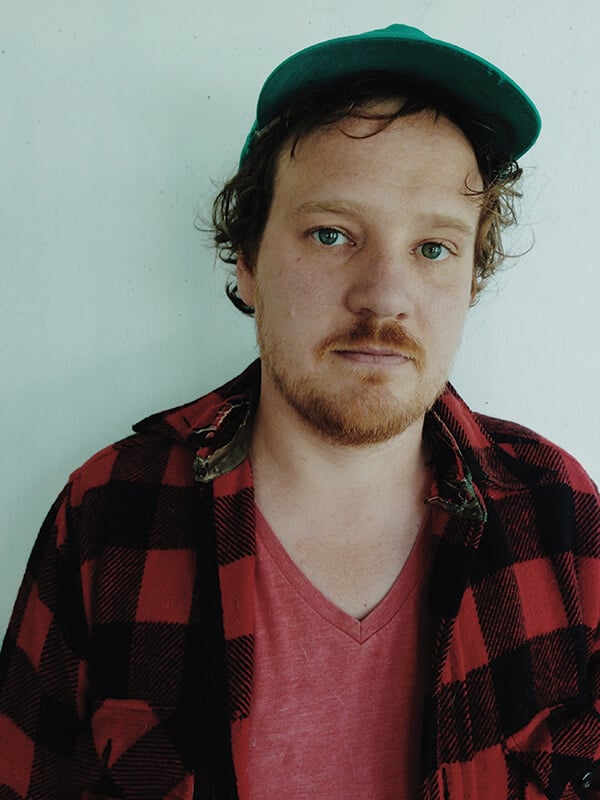AN INTERVIEW WITH MICHAEL NAU
I first met Michael Nau in Indianapolis, of all places. It was 2006 and his band, Page France, was performing at the Midwest Music Summit, a new showcase for all things indie (which ultimately fizzled out the following summer). Page France was, for me at least, one of the best bands of the 2000s. And Nau was, at the time, one of the humblest, most soft-spoken musicians I’d ever met. Their songs, a mixture of acoustic twee and lo-fi-inspired indie pop, still stand among the best of their generation. Think of Page France as a stripped-down American answer to Belle and Sebastian.
After a few years and a few out-of-print releases, Nau and fellow Page France member Whitney McGraw (who also happens to be Nau’s wife) split to form a new group, Cotton Jones. Signed to the same label as Page France (Suicide Squeeze), Nau again continued his songwriting path towards a personal, yet identifiable grab-bag of Americana, dream-pop and psychedelic folk.
Fast-forward to 2016, and we’re getting the first (official, anyway) solo release from the enigmatic singer/songwriter. Although, truth be told, Nau’s personal stamp is so definitive on his bands’ works that they all seem to be solo projects. Mowing is a compilation, of sorts. It’s a collection of “lost recordings” that Nau didn’t set out to craft for any particular album. He just makes music for the sake of making music, and frankly we’re better off for it. The result of a rotating cast of guests and varied recording locales, Mowing is, at times, a somber work that sees the artist enter his 30s, into family life, and into the future that waits beyond.
We recently caught up with Nau to chat about the record and his creative process.
Do you approach the writing or performing process differently for solo material than band material?
I guess I haven’t really had to think too much about it. A lot of the songs on the new record could have easily been Cotton Jones songs or Page France songs. I think a lot of the reason this wasn’t a Cotton Jones record is because that’s become a little more difficult to do with my wife, now that we have a family. I’m trying to keep busy, so this [process] makes the most sense to me.
The songwriting process is always different, though. A lot of the Cotton Jones stuff started with a groove, a landscape of sorts. There was pretty much an instrumental written before any words. So that’s one way to do it. More recently, I’ve been writing more with just an acoustic guitar. I don’t really have a setup to record a bunch of stuff in my home. So it allows me to spend more time actually writing the songs, with just a simple guitar or piano.
The recording for this record was scattered over time and place. Was there a conscious effort to make a cohesive album out of the tracks, or was it just time to finally get all this music out there?
For me, I guess over the past four or five years I’ve been wanting to make a record. And in my mind, making a record all the time. I’d have these little sessions from time to time, whether it was just me or a group of people, and we’d go in and it would result in like three or four songs. When it’s all said and done, there were so many songs it was hard to make sense of. My buddy Kenny Tompkins dug through a bunch of the tunes for me and took songs from each session – somehow they’re different enough but they all work together. We weren’t trying to make it too cohesive, but somehow it works.
There are some songs as recent as last October, and some of it goes back to the last Cotton Jones record. Five years, maybe? Friends of mine run this record label called Yellow K out of Baltimore. They helped me…how do I put it?
Curate the record?
Yeah, nothing was making sense for the record. So they had the idea of putting together a collection, not trying to be too cohesive about it. They were helping me out; we were just going to do a small run of them, but Suicide Squeeze ended up wanting to put it out.
Do you gravitate more towards working with a producer when it comes time to record, or are you more of a DIY kind of guy?
Well, recently is the first time I really worked super collaboratively in the studio. A couple songs were recorded live; all I did as played guitar and sang. That was really great. I don’t know, I’d prefer to do it that way. I took a stab at producing in the past, and it didn’t work out for whatever reason. This time…I found myself liking the songs more, when there’s not as much as myself all through it.
I also enjoy the process of recording a bunch of instruments myself, as well. But I’ve done that long enough now that I’m anxious to do more live [recording].
The new record features a richer vocal timbre than we’re used to from you. Has your voice changed over time, or did you make an artistic choice to use a lower register for these songs?
I feel like sometimes you learn to write a song in a key that’s most comfortable for you. So I’m not too conscious of it, but it probably has evolved over time as I write more.
Lyrically, what I hear on the new record, especially in “Smooth Aisles,” is perhaps a feeling of uncertainty or a sense of leaving behind your carefree twenties. Can you touch upon that?
I don’t know how conscious that is, either. I just entered my thirties, but I don’t know how much of that enters the work. I still try to feel like I’m in my carefree twenties! [laughs] I spent a lot of time on the road, all my life, but recently I’ve spent a lot of time at home. I guess I don’t feel like I’m on the move as much…

Do you have a desire to go back on the road?
Absolutely. With a family, we we were able to take our kid out a couple times, but it’s kind of tough. I plan on doing a tour, but maybe break it up a little so I’m not on the road for five weeks at a time. I’d probably take a band, but it wouldn’t be the whole family out on the road.
I’ve played solo a few times, and that’s kinda cool, but I definitely prefer to have a band at all times. Taking our kid on the road made it a lot more expensive and tricky [laughs]. And he just started school, so we probably won’t be doing that as much.
It seems like a lot of your process is unconscious. Is there anything you consciously go back to as an influence, anything that has left an imprint on your sound? I hear a bit of early John Lennon solo records on things like “So, So Long.”
Yeah, recently I’ve been listening to a lot of Plastic Ono Band. Where a lot of these songs were written over such a long period of time, it’s hard to say what records actually influenced them. A lot of times I feel like I listen to the recording of a song, the sound quality of it, and gravitate towards that more than the actual song. But as far as records go, a couple years ago I really got into Astral Weeks. Stuff like Curtis Mayfield…it’s kinda all over the place.
So the big question is, why release it now?
For me, I guess I’ve been trying to release an album for the past four years, and there isn’t a reason why I didn’t. I guess I just didn’t have anyone to put anything out. Or maybe I just didn’t get it together well enough. Once I stopped trying to control that process of putting out an album, it just came together. More so than anything, I want to get on the road and keep putting out music. I got to a point where it was like, now or never. If it went too much longer, I probably wouldn’t have put out a record at all.
Really, it was just more or less someone putting it out that made me do it.
That someone being Suicide Squeeze. How is your relationship with the label? Is it even necessary for indie bands to have a label anymore?
I’m comfortable working with Suicide Squeeze; they’ve put out all my full-lengths. David [Dickenson], who runs the label, is a friend. I trust him, trust his input. I don’t know a lot about that aspect of [the business]. I guess you could release an album and not have a label, a lot of people do that. And that probably would have been my next thing, if I didn’t have someone to put it out. It’s cool to have someone help with all the [business stuff], though.

As someone who’s been able to maintain a career and longevity, is there anything you can convey to other musicians about having some staying power?
Don’t change your band name like 20 times [laughs]. That could be helpful!
One thing that keeps me going, as generic as it sounds, it that this is something that I love to do. And it doesn’t really matter to me if someone listens to it; I’ve kinda found ways to make a living out of what it is. If we play shows to a few people, we find ways to make it work. All because you love to do it; that’s what really keeps me going.
What do you have planned for the future, creatively?
I’d like to do more solo work, but do it with a band, you know? It would kind of be an ever-changing band, with whoever’s available. Do more stuff recorded live. With this project being a solo thing, there’s still more people involved with it than any other record I’ve ever done [laughs]. I kinda like that element of it. And I’d like to do that a lot more, and just keep the cycle going.
Follow on Twitter @naumichael
Michael Nau’s Mowing is out now on Suicide Squeeze.
photos by Julia Robbs and Whitney McGraw
